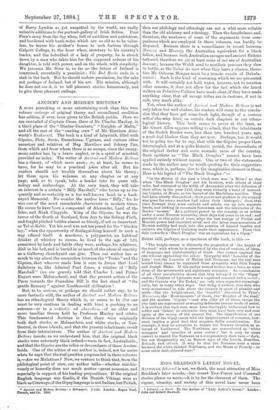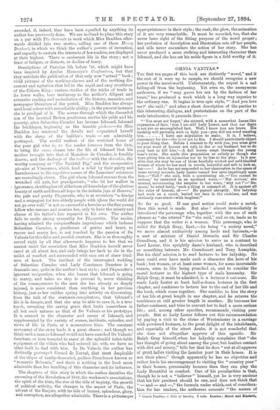MISS BRADDON'S LATEST NOVEL.
ALTHOUGH Ishmael is not, we think, the most attractive of Miss Braddon's later novels,—her recent New-Forest and Cornwall stories please us more,—it is by far the cleverest of them. The vigour, vivacity, and variety of this novel have never been • /shmael : a Novel. By the Author of "Lady Andlers Eecret." London: John and Robert Maxwell.
exceeded, if, indeed, they have been equalled, by anything its author has previously done. We are inclined to place this story on a par with The Outcasts (a work which Miss Braddon after- wards divided into two stories, calling one of them Henry Dunbar), in which we think the author's powers of invention, and capacity to sustain the interests of her readers, are displayed at their highest. There is exuberant life in the story ; not a trace of fatigue, or distaste, or decline of fancy.
Descriptions of Parisian life before '48, which might have been inspired by Arsene Houssaye's Confessions, but that they antedate the publication of that only now " actual " book ; vivid pictures of the working-classes and of the seething dis- content and agitation that led to the rapid and easy overthrow of the Citizen King ; curious studies of the tricks of trade in its lower walks, bear testimony to the author's diligent and extensive reading and assimilation of the history, memoirs, and newspaper literature of the period. Miss Braddon has always used local colour with remarkable ability ; in the present instance she is prodigal of it. The scenes through which the discarded son of the besotted Breton gentleman carries his pride and his poverty, after Sebastian Caradec has become Ishmael, Ishmael the bricklayer, beginning as the humble gcicheux—for Miss Braddon has mastered the details and acquainted herself with the slang of the builder's trade — are admirably portrayed. The sordid realism of the wretched home of the poor girl who is, as the reader foresees from the first, to bring the same shame into the life of Ishmael that his mother brought into that of Monsieur de Caradec, is forcibly drawn; and the dealings of the trotteio- with the eharabia, the worthy company at "The Faithful Pig," and the co-operative pic-nics at Vincennes, which lend a relief by their gaiety and harmlessness to the repulsive scenes of the Lemoines' existence, are exceedingly clever. The girl whom Ishmael rescues from the wretched old pair, her grandparents, "who let her wallow in • ignorance, shutting her off alike from all knowledge of the glorious beauty of earth and from all hope in the infinite joys of Heaven," the pale and pretty Paquerette, who is at seventeen "a drudge and a scapegoat for two elderly people with whom the world did not go over well," is not so successful a heroine as the fine young fellow who rescues and marries her, only to have the misery and shame of his father's fate repeated in his own. The author fails to excite strong sympathy for Paquerette. The reader, having admired the compassitmate imprudence which induces Sebastian Caradec, a gentleman of genius and heart, to rescue and marry her, is not touched by the passion of De Valnois for this false and peevish creature. She is so thoroughly served right by all that afterwards happens to her that we cannot resist the conviction that Miss Braddon herself never cared at all about her, and only brings her back to die in the midst of comfort and surrounded with ease out of sheer kind- ness of heart. The incident of the interrupted wedding of Sebastien Caradec and Lady Constance Danetree is a dramatic one, quite in the author's best style ; and Pilquerette's ignorant resignation, when she learns that Ishmael is going to marry, and takes no step to prevent it, never thinking of the consequences to the marl she has already so deeply injured, is more consistent than anything in her previous history, just as her sudden spring into activity on discovering, from the talk of the workmen-conspirators, that Ishmael's life is in danger, and that she may be able to save it, is a true touch, revealing the saving grace that lurks somewhere in all but such natures as that of De Valnois or his prototype. It is centred in the character and career of Ishmael, and supplemented by the variety of scenes, incidents, episodes, and views of life in Paris, at a momentous time. The constant movement of the story lends it a great charm ; and though we think such a man as-Ishmael would not have smashed De Valnois' furniture, or been tempted to sneer at the splendid toilet-table equipment of the villain who had seduced his wife, we have no other fault to find with him. In De Valnois the author has distinctly portrayed Gerard do Norval, that most despicable of the clique of vanity-demented, godless Frenchmen known as "romantic Bohemia," and there is nothing in the book more admirable than her handling of this character and its influence.
The chapters of this story in which the author describes the oncoming of the Revolution of 1848, the workmen's associations, the spirit of the time, the rise of the tide of impiety, the growth of political activity, the changes in the aspect of Paris, the advent of the Empire, with its tide of luxury, splendour, glory, and corruption, are altogether admirable. There is a picturesque
appropriateness in their style ; the rush, the glow, the animation of it are very remarkable. It must be recorded, too, that she never loses sight of the fitting purpose of the novel proper ; her profusion of description and illustration sets off her people, and aids never encumbers the action of her story. She has never produced a more striking and interesting character than Ishmael, and she has set his noble Sore in a field worthy of it.

































 Previous page
Previous page